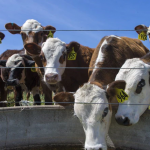
Pauline Hanson’s push for a minimum price for milk has been killed off, with Nationals senators resisting pressure for new dairy industry rules.
The One Nation leader’s private bill was voted down 31 to 30 on Monday after crossbench party Centre Alliance and independent Cory Bernardi helped the government block its passage.
Senator Hanson made an impassioned plea in the upper house.
“Represent the people of this nation, who are dairy farmers, who are on their knees and all they want is a fair price for their milk,” she told parliament.
“The public will pay for it.”
The legislation would have tasked the competition watchdog with determining a base price for milk, while the Productivity Commission would have looked at a divestiture regime for the industry.
A mandatory code of conduct for the food and grocery industry – including dairy – would also be established.
Queensland Nationals senator Susan McDonald said the bill was hastily drafted and could have adverse unintended consequences for farmers.
“I agree completely there are dairy farmers who are on their knees who are considering the ultimate solution,” she said.
“It is appalling and tragic and I will fight every day for them.
“This will not solve their problems. What’s worst of all is it gives them hope when it will not provide it.”
NSW Nationals senator Perin Davey said she had hit the phones to see what dairy farmers thought of the bill.
“Not one of the farmers I spoke to said they wanted a floor price. They all said they wanted a fair price,” she said.
The federal government is holding a final round of consultations for a dairy code of conduct, which has been brought forward to come into place next year.
Labor frontbencher Murray Watt said Senator Hanson’s bill largely reflected policies his party took to the federal election.
“The National Party makes a lot of noise about standing up for farmers,” he told reporters in Canberra.
He said supporting the bill would have proved the Nationals cared about dairy farmers’ problems.
Centre Alliance’s Rex Patrick said the government had performed poorly in helping the industry but the bill wouldn’t address the core problems.

























